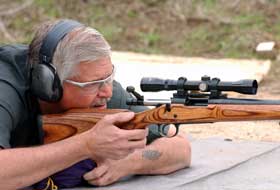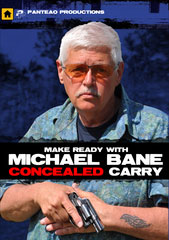I got asked for some thoughts on why I thought competition is important for people concerned with protection in the Real World, and after I answered the question I thought you all might like to see that answer:
Couple of quick thoughts on competition...regardless of the style of competition, I think competition has a major effect in three specific areas:
1) Gun-handling skills
2) The ability to "game" a situation
3) Stress inoculation
As it happens, all three of those areas are critical in terms of Real Life shooting skills. First and foremost are gun-handling skills. Let me watch a shooter for 5 minutes and I can tell you if he or she shoots competition simply by watching the gun-handling skills. An example I've used before...I was at an Advanced Concealed Carry class at a major shooting academy a few years back, The class consisted of 6 people, all with years of experience as shooters. Three were competition shooters; 3 non-competitors who shot together in "informal" competition at least once a week.
The informal guys shot on par or better than the competition shooters (2 IDPA; 1 USPSA), but they fell apart on jam clearance (big time!), shooting from awkward (what I call "broken") positions and somewhat on shooting on the move. The informal guys also lacked that fluidity of motion that comes from a steady diet of competition shooting...they still had to think about what they were doing on, say, the draw, whereas pistol competition shooters practice the draw so much that it is truly an ingrained reflex. I once outdrew someone who meant me harm, simply because I have draw a gun so many times it is something that happens without conscious thought (I also scared the crap out of my Sweetie last week while we were walking Alf the Wonder Beagle...two huge black dogs raced out of the nearby woods, barking and running straight for us...I cleared the J-frame from the pocket holster and was indexing the red dot laser on Poochie #1's head when the owner came running out screaming, "Harmless! Harmless!" In truth, I don't recall drawing and indexing the gun at all...and why should I? All my available RAM had to be focused solely on shoot/no shoot decision).
Second, the ability to "game" a situation...I know IDPA rants about how this is a bad thing, but that's bullshit. The difference between living and dying is measured by an individual's ability to perceive a situation, process the information and proceed to the correct action. That is the definition of "gaming." I strongly refer you to Malcolm Gladwell's book BLINK on how quickly we can truly process information. You might also consider Amanda Ripley's THE UNTHINKABLE: WHO SURVIVES WHEN DISASTER STRIKES — AND WHY or Larry Gonzales' DEEP SURVIVAL: WHO LIVES, WHO DIES AND WHY. I';d also recommend my book TRAIL SAFE, but you gotta pay too much for it on eBay these days...I will have an updated version in a couple of months. The ability to game is a fundamental survival skill, and all the shooting sports teach it. As we become more experienced on the range, our ability to game is drastically enhanced...I figure a good USPSA or IDPA competitor has a stage gamed out in less than half-a-second after seeing it...he or she doesn't need to walk around pointing a finger pistol at the target to understand what needs to be done.
Thirdly, and most important of all, stress inoculation...the more you are stressed, both mentally and physically, the better you are able to handle said stress. Think about dry-firing...dry-firing works because your mind doesn't draw a distinction between live fire and dry fire. You ca become a master shooter (in the sense of sight picture and trigger squeeze) without firing a live round or leaving your living room. Similarly, your mind doesn't draw a distinction between "real" stress — I am about to be eaten by a saber-toothed tiger — or "fake" stress — a timer. Stress is stress, and each time you apply that stress to your body and mind, you "inoculate" yourself against "real" stress the same way a mild case of cowpox protects you from the much deadlier smallpox. I have proven this in my own experiences in the extreme sports, and it is an article of faith among police and military trainers. Stress puts a huge chemical load on your body, and the only way to understand how to handle that load is through experience. If we go back to my first gun-handling example, I would wager that the men who spent their time in informal practice, even though they were skilled shooters, did not get the stress inoculation benefits of formal competition because when we practice alone or with friends, even though we may push ourselves, we lack the external stress components, e.g., my performance s being measured by an outside observer and, yes, people are watching and will see if I screw up.
Hope this helps!
Michael B
Monday, July 14, 2008
Subscribe to:
Post Comments (Atom)






13 comments:
I think you hit the nail on the head, as long as the person, keeps the idea of training in the back of their mind, or they may decide to play the "Game", not that's a bad thing ether.
Gee just wondering what percentage of time during the day should a regular walking around middle class person think about shooting people, dogs and things?
I agree with your points one and three but if your Game doesn't have you moving off the X and getting behind cover it might bite you in the butt in a gunfight.
Ratcatcher55
Michael: All good points and well presented, but I would add that of the three, the ability to function under stress is probably the most important.
Another point I would add is "Movement". Not just learning how to shoot on the move, but simply "Moving". Believe it or not some people have to be told to "Move" or "Get Out Of The Way".
Gun fails --- Keep Moving. Fix it later when you reach another state; either of safety or geography.
Good job.
All The Best,
Frank W. James
Unfortunately, the stress inoculation of the USPSA/IDPA timer wears off quickly.
I find that if I don't shoot a match for a few weeks, I start reverting to "timer anxiety". If I shoot more frequently, it goes away again.
Strangely enough, same thing holds with chili peppers... Have a good curry after the regular Friday night match and all's right with the world!
Joe
The experience you get in clearing jams on the clock is invaluable. We ran a CCW side match at our local USPSA club Saturday. Nothing very hard, 2-3 targets at about 6 feet, 5 shots per string, two stages, starting from low ready. We had a variety of different guns, from a Walther P22, PPK, J-frame snubs, Kel-Tec 380s to a Glock 23. I usually shoot a Glock 17 so I was using my normal pocket gun, a Glock 26.
Many of the shooters found out that their little guns did not run as well as their big ones, myself included.
I had a failure to feed on one of the strings, a Mozambique on one target and double tap on the second. The gun jammed on the head shot on T1 and I noticed it on the transition, cycled the slide and completed the string with a total time of 2.69 seconds.
There is no way I could have learned to do that without countless repetition learned on the clock.
Good stuff Michael!
Shoot safe,
John Ellis
You know, I actually blame you for getting me (back) into practical shooting. If you didn't make it look so fun on Shooting Gallery, I wouldn't be spending boatloads of cash on .40 S&W pistols and ammo so I can shoot major.
I tell you, it starts with bowling pins, then steel, then USPSA, IDPA, and the next thing you know you're looking at an entry form for the Bianchi Cup thinking "I can totally shoot this match and get my ass whipped by World-Class shooters".
Just what data do you have indicating competition shooters outperform regular joes in self defense shootings?
How would you define better?
Years of reading Ayoob's columns and The Armed Citizen make me doubt your hypothesis. It sounds good but things that sound good aren't always true.
Ayoob is also a proponent of competition. He was one of the first 4 gun Masters in IDPA.
The late Jim Cirillo, one of the officers in the controversial NYPD Stake-Out Squad, once remarked that he never felt as much stress in a gunfight as he did in competition.
I agree that sounding good is not the same as being good, but in this case there is more evidence than just Michael's word.
John
iain,
Just what is the evidence that shows competition shooters perform better in SD shootings? While Ayoob may recomend competion I can't recall a single column where he discusses gunfights and he says Joe Blow survived because he was a competition shooter.
I am not trying to diss competition shooting but I don't necessarily buy into the theory it makes a better shooter in a SD scenario.
The number of competetion shooters falls way short of the number of CCW holders I would venture a guess. I would thus suspect most SD shootings involve non competion shooters.
I'm just looking for data, and not BELIEF, that competitive shooting increases the odds of surviving a gunfight.
I concede your point. I do not know of a definitive study showing that
competition increases one's performance or survivability in a
gunfight.
However skill are improved by practice and competitive shooting is an
excellent vehicle for practicing certain shooting and gun handling
skills. It will not teach you tactics.
I don't think competition is the end-all be-all for a CCW holder.
Ultimately it's a game,defined by rules that the gamemakers felt were
safe and followed the spirit of the game. Competitive shooting is and
should not be the only tool in your toolbox. It is an excellent way to
evaluate your skills however.
If someone does have more information linking competition shooting
and gunfight performance, positive or negative, please let me know. Perhaps there are some military folks with combat experience who can chime in.
Thanks,
John Ellis
Michael - Great post! I am very new to shooting and have started to participate in IDPA and USPSA. I was so intimidated at first! The matches have helped me improve my firearm handling skills tremendously.
Ahab - You are so right! It all starts with bowling pins and escalates from there. This is exactly how it happened for John. I never knew there was a pecking order :)
I love the brave anonymous poster!!
My oh my!
You want proof that competition shooters will/can do better?
Can you draw your weapon in a second or less? Can you reload said weapon in a second or less?
Can you do so on the move?
Competition will teach you to do so and to refine that ability.
SPEED is a tactic.
I'm sorry McBane, but you've totally hit the nail on the head with this post and it's one of the things that gets me the most worked up in the shooting world. You have literally hundreds of "tactical" trainers that won't step one foot inside the competition arena because they will get their ass handed to them royally by a competent C level shooter. And they will be completely, totally, and utterly destroyed by the M or GM shooters.
And then they'll turn around and say that "well, *they* didn't shoot it tactially, like me." Or, "that will get you killed on the street!"
OK, deep breath and relax now....
I would add that the competition arena also provides you with the ability to see if your equipment works - is your weapon reliable? Does your holster work? Will your ammuntion cycle your weapon properly? Does your vest work, or do the pockets on the inside of it catch the butt of the gun every time you draw? Etc Etc Etc. I don't know about you, but I'd rather find those things out when all that will happen is I get beat that day, and not shot.
I have blogged, talked, and pleaded with cops and chl holders to come shoot matches. Some of them listen, and the rest of them continue to suck.
Post a Comment